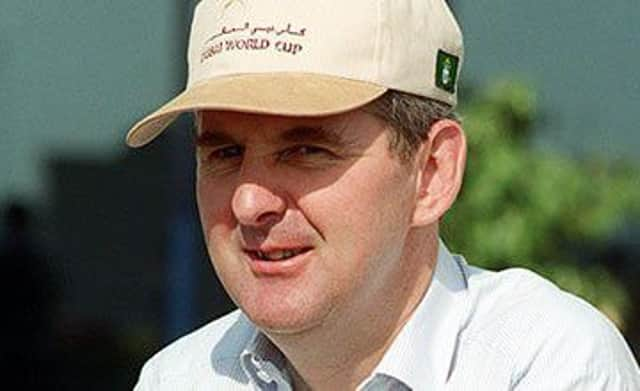Obituary: Lord John FitzGerald, racehorse trainer


LORD John FitzGerald was a moderately-successful Newmarket racehorse trainer during the 1980s until the wealthy ruler of Dubai, Sheikh Mohammed bin Rashid Al Maktoum, asked him in 1992 to help put the United Arab Emirates (UAE) on the international horse-racing map.
Within four years, he had largely done so, helping turn the emirate of Dubai, the UAE’s most-populous city, into what is now a top-class world thoroughbred racing hub. He also helped Sheikh Mohammed launch the Godolphin Stables, its royal blue silks now probably the most familiar in the world.
Advertisement
Hide AdAdvertisement
Hide AdA British army captain from what was for centuries Ireland’s most powerful aristocratic family, Lord John created what is now the Emirates Racing Authority, the governing body of horse racing in the UAE, the small but mega-rich oil-producing state on the Persian/Arabian Gulf which includes Dubai.
He oversaw the establishment of a turf track alongside the dirt track at Nad al Sheba, now known as Meydan Racecourse.
Built on what was once an arid desert traversed by Bedouin nomads and their camels, Meydan is now seen as an Arabic Ascot, with glittering state-of-the-art grandstands. It is visited by royalty, celebrities and wealthy race-goers from all over the world. Among its attractions is the Dubai World Cup, the world’s most valuable race which Lord John helped inaugurate in 1996, now worth $6 million (£3.8m) to the winner.
This year’s race was fittingly won by the Irish-bred gelding Prince Bishop, owned by the son of Lord FitzGerald’s former boss Sheikh Mohammed and the Godolphin team, who promptly gave the prize money to an autism charity.
The Meydan racecourse also hosts concerts, with Lady Gaga performing last year and Kylie Minogue earlier this year.
Lord John FitzGerald, a descendant of William the Conqueror, was born on 3 March, 1952, in the family seat, Kilkea Castle in County Kildare, a medieval stronghold which has been in the FitzGerald family for more than 700 years.
His father was Gerald FitzGerald, eighth Duke of Leinster, giving young John the courtesy title of Lord from birth, though not a seat as a peer in the House of Lords. Hence, he was always known as Lord John FitzGerald rather than Lord FitzGerald.
His mother was Anne Smith, Duchess of Leinster and daughter of Lieutenant Colonel Philip Eustace Smith of Morpeth, Northumberland. On the death of their father in 2004, Lord John’s elder brother Maurice became ninth Duke of Leinster and Earl of Offaly, titles Lord John would have inherited through male lineage had Maurice died before him. One of Lord John’s ancestors, also John FitzGerald fought alongside King Edward 1 against the Scots in the 13th Century and joined the king on the trip homeward to think again.
Advertisement
Hide AdAdvertisement
Hide AdLord John was educated at Millfield School, Somerset, before enrolling at the Royal Military Academy at Sandhurst like many of his ancestors.
He joined the 5th Royal Inniskilling Dragoon Guards, an Irish regiment of the British army, where he served in the British Army of the Rhine and as part of United Nations forces in Cyprus in the 1970s, rising to the rank of Captain. He married Barbara Zindel, of St Moritz, Switzerland, in 1982, and had two children, Hermione, now a professional golfer aged 29, and Edward, now aged 26.
After his army career, Lord John, always a fine horseman, started off as an amateur jockey, riding in more than 100 races, before being taken on aged 29 as assistant trainer to Bruce Hobbs at Newmarket, the cradle of thoroughbred racing. In the early 1980s he set up on his own at Albert House Stables, one of the oldest in Newmarket, having his greatest success with the two-year-old Sizzling Melody in 1986.
That year, the horse won the Norfolk Stakes at Royal Ascot and the Flying Childers Stakes at Doncaster, both times with Richard Hills in the saddle.
Rising interest rates in the 1980s, however, torpedoed Lord John’s expansion plans and he gave up his trainers’ licence in 1991. Soon afterwards, Sheikh Mohammed took him to Dubai and the rest became part of Dubai’s modern history.
After Dubai, he became a horse racing steward in Hong Kong and later director of racing at the Macau Jockey Club in China, near Hong Kong, from 2000-2002, this time helping put the former Portuguese colony’s horse racing on the map.
After returning to Europe, he was a trainer in Berlin for three racing seasons but ended his career as highly thought of racing manager for thoroughbred breeder Kirsten Rausing, one of Britain’s wealthiest women, at her Lanwades stud farm in Newmarket.
Rausing, who knew Lord John for 30 years, said after his death that he had been a major influence at Lanwades, often recognising the early potential of foals including two of last year’s top fillies, Cubanita and Madame Chiang.
Advertisement
Hide AdAdvertisement
Hide AdJockey Richard Hills, who rode the majority of the horses trained by Lord John in the ‘80s, said the aristocrat asked everyone just to call him John. “He was a really nice man, a true gentleman and a massive player in the development of racing in Dubai, putting the structure in place.”
Lord John was the subject of unwanted headlines three years ago after his wife, Lady Barbara, then 55, eloped to her native Switzerland with arguably the greatest flat-racing jockey of all time, Lester Piggott, then 77, who is also still married. Both Lord John and Piggott’s wife of more than 50 years, Susan, said at the time: “We’re OK with it. We’re all still friends.”
Lord John FitzGerald is survived by his daughter Hermione, and son Edward, who is now heir to the Dukedom of Leinster, currently held by Lord John’s brother Maurice.